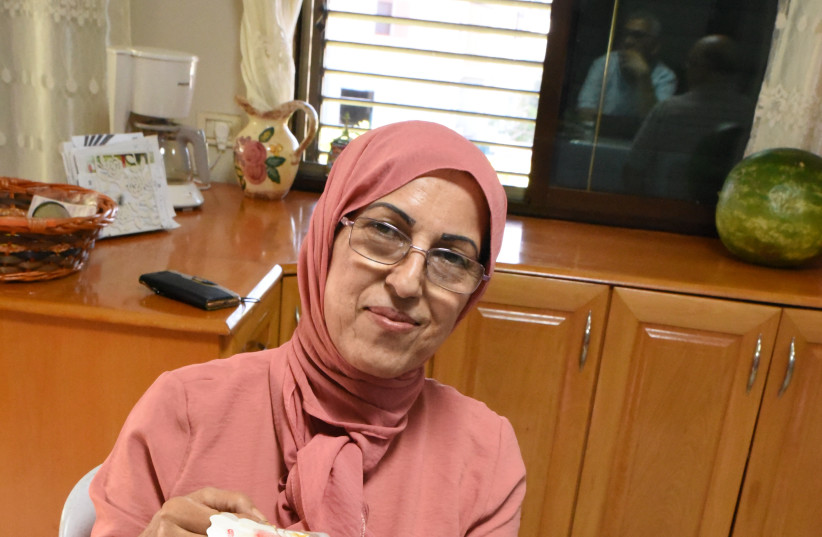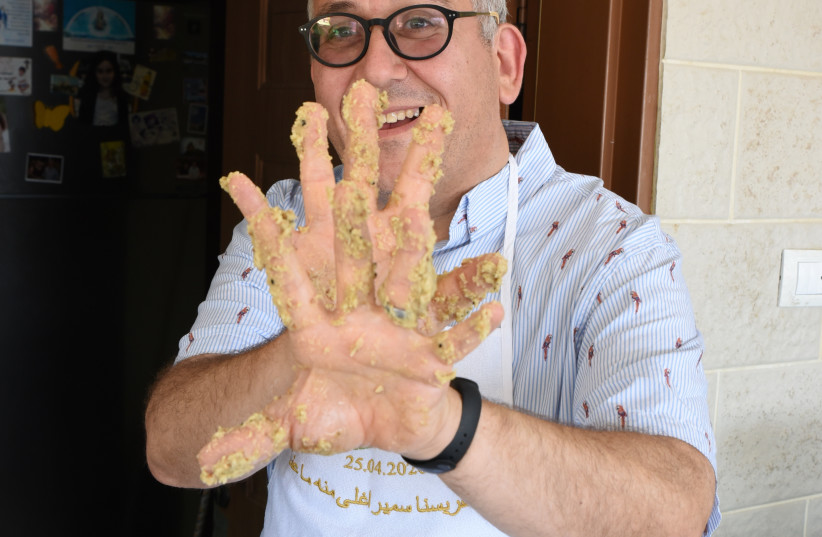Looking back on the day, we really shouldn’t have eaten quite so much. Sated, happy and just a tad sleepy as we made our way back to the center of Israel, we were left thinking about one thing our host said: “The Galilee really is the center of the country and you fellows live in the periphery. You may think you live in the center with your straight roads and fast internet but from where I’m sitting, the real center is up here.”
Paul Nirens is jovial, polite to a tee, an expert translator and a dab hand as a cook. But when introducing his guests to what is in essence Galilean peasant food, he leaves it to the real locals to dish up the sumptuous feats. Australian-born Nirens loves life in the lower Galilee. He doesn’t mind the windy roads, the harsher winters or the distance from the great metropolises of the coastal plain.
“For me in many ways, this is the real Israel. Christians, Muslims, Druze and Jews, all as neighbors, just getting on with life in the most beautiful spot,” says Nirens, who founded Galieat, which offers grassroots cultural experiences, based around food, working closely with a wide variety of host families.
“Our programs include cooking workshops, home hospitality and meals in local Galilean villages, cross-cultural immersion, full-day culinary tours and more,” reads his website galileat.com.
“Send me your coordinates and I’ll meet you and then you can follow me up to Roudena’s home,” he says over the phone as we took in the hillside villages, verdant forests and clean air.
And we couldn’t have found her Deir Hana home without him. Perched at the top of a flight of steps and the very peak of the small town, Roudena beams.

“Welcome, welcome,” is about as far as her English takes us. But for non-Arabic or non-Hebrew speakers, Nirens is constantly on hand to interpret and add his own wit and cooking tips.
No sooner are we across the threshold of this Christian home in a predominantly Muslim community, then Roudena is helping us into our crisply-laundered aprons.
“We’re going to make malatit,” she says. We are none the wiser but as we assist her in making these herby-spicy cookies, Nirens relays the ingredients and cooking method.
This local biscuit includes nigella seeds and ground aniseed, which gives it an unusual punch. Not too sweet, the cookies are a great dessert but could just as easily be served instead of crackers with cheese or as a mid-morning snack with a cuppa, as we Brits call it.
Thinking we were just going to nibble on a couple of malatit before heading to host number two, Roudena put us right. As we followed her into the kitchen to place the spiced-and-shaped dough into the oven, she uncovered the pots on the stove, their contents bubbling away, sending heady aromas in our direction.

MOMENTS LATER we were tucking into a veritable feat of okra in a tomato-garlic sauce, lentil and bulgur-wheat mejadra topped with burnt onions and the freshest vegetable salad, all washed down with Roudena’s lemonade.
“Pretty much everything you just ate was grown in Roudena’s family fields on the surrounding hills,” Nirens beams.
After we managed a couple of cookies each, Roudena presented us with a bagful “for the rest of your day.”
Perhaps Nirens hadn’t told her what was yet to come.
Pushing the driver’s seat just that little bit further away from the steering wheel, we followed Nirens down winding country lanes and along the narrowest of twisty, uphill village streets to Pnina’s home.
The warmth in her eyes, infectious giggle and wondrous storytelling makes you feel at home, as you walk through Pnina’s doorway. In Hebrew she tells her story and that of the Druze of the region. She answers all questions, believing it is her role to explain away some of the mystery surrounding her faith.
If you meet her, be sure to ask how on earth she gained a Jewish name (or you could listen to our podcast interview with her www.jpost.com/podcast for the hilarious answer).
While at Roudena’s house we made malatit from scratch, here, Pnina had already prepared the dough for zalabia. Our job was to knead, roll, make large holes and then fry this local bread. Nigella seeds and aniseed were accompanied by za’atar or hyssop, adding wonderful colors to the bread we devoured in no time.
Yet again, a table was set, this time with labaneh – a soft, slightly sour cheese, salads and a flat-bread almost as large as Pnina herself.
Throughout the day, and as we were increasingly wishing we’d worn looser clothing, Nirens offered insights on the region, his hosts and himself. He had the idea of launching Galileat after spending an extended period in Italy, witnessing how villagers open their homes to visitors from a few hours up to a week so they can learn some of the secrets of authentic local cooking.
Business was thriving before the pandemic. He’d had to take on staff to help with guiding, administration and more. He’s hopeful things will pick up once again but like so many was hit hard in the pocket by coronavirus.
Our final stop was in the Muslim village Kaukab Abu al-Hija, or Kaukab as most call it. Saada’s English was impeccable. She returned to the Galilee after living in Texas. Here the conversation flowed more. It was less storytelling and more conversation. Saada’s home felt more modern than those of Roudena and Pnina.
We rolled and stuffed vine leaves as she told of picking fruits and vegetables as a child growing up in nearby Sakhnin. These healthy bites were laid out along with other stuffed vegetables, including delicious stuffed pickled cucumbers accompanied by a well-seasoned tabbouleh salad. To cap it all, Syrian sweets.
Our hosts were gracious, the conversations delightful and our appreciation for the Galilee as the center of Israel was complete. And now you understand why we both smiled contentedly the entire journey home – before hitting the bathroom scales.
The writers were guests of Galileat. Find out more at galileat.com. You can hear more of Mark and David’s adventures on the Travel Edition of The Jerusalem Post Podcast – www.jpost.com/podcast.
